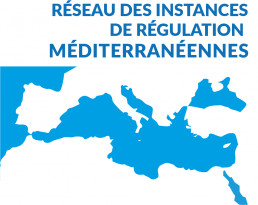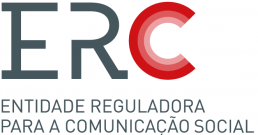Creation and status
The Portuguese Regulatory Authority for the Media – ERC is an independent administrative body established by Law 53/2005, 8 November.
ERC performs the tasks entrusted by the Portuguese Constitution on media regulation and guides its work independently of any lines of approach on the part of political authorities.
ERC operates since February 17th, 2007, when its first Regulatory Board took an oath before the President of the Portuguese Assembly of the Republic. Through this act, the previous regulatory authority in Portugal, High Authority for the Mass Media (Alta Autoridade para a Comunicação Social) was abolished. On November 9th 2017, its second Regulatory Board took office.
ERC is established in Lisbon.
Organization
ERC consists of the following bodies: the Regulatory Board, the Executive Directorate, the Advisory Council and the Auditor.
The Regulatory Board, responsible for defining and implementing the regulatory activity of ERC, comprises a chairman, a vice-chairman and three board members. The members have a 5-year term, not renewable, and remain in office until their effective replacement or termination of service.
Four members of the regulatory board are appointed by a majority equal to two thirds of all members of the Portuguese Assembly of the Republic and the fifth member is co-opted by its peers. The chairman and vice-chairman are elected from among its members. All members shall take office before the President of the Assembly of the Republic.
The regulatory board holds ordinary meetings once a week and extraordinary meetings where convened by the chairman, on his own initiative, or at the request of two other members. The regulatory board decides by a majority of the votes cast, being required the vote in favour of at least three members.
The members of the regulatory board shall appear before a Committee of the Assembly of the Republic (Committee on Culture, Communication, Youth and Sport) to provide on request information or clarifications on their work.
ERC must inform the Assembly of the Republic of its determinations and activities, by sending every month a collection thereof. ERC must also submit an annual report on its regulation activities, as well as the respective report and accounts, for a debate, preceded of a hearing.
Currently, the Board encompasses five members for a five year mandate entered into office on 14 December 2017:
- Chairman: Sebastião Povoas
- Vice-Chairman: Mario Mesquita
- Member: Francisco Azevedo e Silva
- Member: Fatima Resende
- Member: João Pedro Figueiredo
The members of the regulatory board are subject to the incompatibilities and impediments of holders of high public office. During their term of office, they are required to not retain interests of a financial nature or shares in companies that pursue mass media activities and carry out any other public function or professional activity, except with regard to part-time teaching duties in higher education. For two years following its termination, members are not allowed to hold any executive post in companies, unions, confederations or business associations of the mass media sector.
The Executive Directorate is the body responsible for the organization of services and for the administrative and financial management of ERC. The executive directorate consists of the chairman and vice-chairman of the regulatory board, and of the executive director.
The Advisory Council is a consultative body that takes part in the definition of the general guidelines for ERC activity, contributing towards the articulation with public and private entities representing relevant interests in the context of the mass media and associated sectors.
The Auditor is the body responsible for monitoring the legality and effectiveness of the financial and asset management of ERC, as well as for providing advice on this field to the regulatory board.
ERC is provided with technical and administrative support services, established by the regulatory board according to the respective work programme and to the extent allowed by the budget.
It currently has a staff of 64 employees serving in the following areas: Cabinet to the Board, Cabinet to the Executive Directorate, Legal Department, Media Analysis Department, Supervision Unit, Registration Unit, Management Department, IT and Library and documentation.
ERC staff shall not work or provide other paid or unpaid services to companies subject to its supervision or to other companies whose activity conflicts with powers and responsibilities of ERC.
Competencies
The ERC regulation mission comprises all legal persons pursuing mass media activities, within the jurisdiction of the Portuguese State, which include press agencies, newspapers, radio and television operators or all natural or legal persons who make publicly available an edited coherent framework of contents, on a regular basis, through electronic communications networks.
Any citizen or legal person may file a complaint regarding behavior liable to be deemed as an infringement of any legal or regulatory provisions that apply to mass media activities. This procedure is entirely free of charge. Within the framework of its powers and responsibilities, ERC may also act on its own initiative. The decisions of ERC shall be subject to appeal.
In accordance with the Portuguese Constitution, ERC shall be responsible for ensuring:
a) the right to information and the freedom of the press;
b) that the ownership of the media is not concentrated;
c) the media are independent from political and economic powers;
d) the respect for rights, freedoms and guarantees within the scope of the media;
e) the respect for the statutes and rules governing the mass media activity;
f) the pluralistic expression of different trends of thought;
g) the exercise of the right to broadcast, as well as the right of reply and of political response.
ERC shall guarantee the fundamental rights regarding the information provided by the mass media including the respect for pluralism, human dignity, and right of reply.
ERC shall secure that the media are independent, as well as the compliance with the legislation concerning the radio and television services, and shall classify periodicals pursuant to applicable legislation.
ERC shall issue licenses for broadcasters.
ERC is responsible for ensuring the independence and pluralism of public service broadcasters. ERC also issues binding opinions on the appointment of heads of programming of public service broadcasters.
ERC shall also be also responsible, in accordance with Law no. 95/2015 of 17 August, for verifying and monitoring the duties of communication and transparency on state publicity campaigns and to disclose monthly reports, on its website.
In accordance with Law no. 10/2000, of 21 June, ERC shall have jurisdiction with regard to opinion polls directly or indirectly concerned with political issues published or broadcasted by the media. These polls shall comply with particular scientific and deontological rules laid down by ESOMAR, and shall only be carried out by entities approved by ERC.
ERC is also responsible for receiving information on ownership, management, equity and liabilities from media companies, in accordance with Law no. 78/2015, of 29 July, and to disclose it publicly in a digital platform, on its website, unless ERC understands that the data’s nature and sensitivity justifies not making them available to the public.
Contact
Contact person: Ms. Joana Pizarro Bravo – joana.pizarro@erc.pt
Postal address:
ERC – Entidade Reguladora para a Comunicação Social
Av. 24 de Julho, 58
1200-869 Lisboa
Portugal
Telephone: +351 210 107 000 / Fax: +351 210 107 019 / E-mail (general info): info@erc.pt

